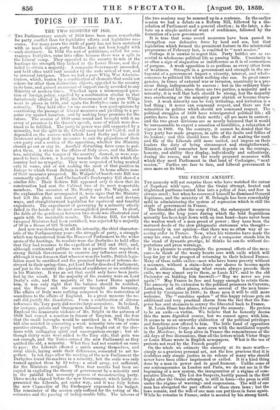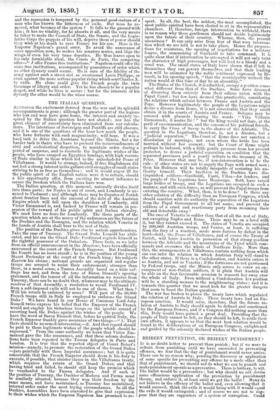THE FRENCH AMNESTY.
THE amnesty will not surprise those who have watched the career of Napoleon with care. After the Orsini attempt, heated and frightened partisans buried him into a policy of fear, and fear is always cruel ; but when he recovered himself he dismissed General Espinasse, and the ministry of M. Delangle has been remarkably mild in administering the system of repression which is still the staple of government in France. The bloodshed after the coup &kat, the subsequent measures of severity, the long years during which the bold Republican minority has been kept down with an iron hand—have never been the wanton work of a man proud of power ; they have been the matured deeds of the slow phlegmatic statesman who thought— erroneously in our opinion—that there was no other way of se- curing order in France. Now, when his victories have made the army his own, and when the glory of a conqueror stands him in the stead of dynastic prestige, he thinks he can do without de- portations and press warnings. It is a pleasure to contemplate the personal effects of the mea-
sure—to think of the weary hearts sore with exile which will leap for joy at the prospect of returning to their beloved France. Many of these noble exiles—men who have borne poverty without a murmur, without a stain—leave our shores to become again French citizens. Knowing what events always precede their exile, we may almost say to them, as Louis XIV. said to the old Pretender on bidding him farewell—" May we never see you again!" May France be free and happy enough to retain them. The amnesty in its extension to the political prisoners in Cayenne, Lambessa, and other places, releases several cf the men trans- ported by Cavaignac in 1848; to these men it will be still more welcome. The sunshine spoken" of this happy release gets an additional and very practical charm from the fact that the Em- peror has sent steamers to convey the liberated back to France.
M. Louis Blanc has declined to accept the amnesty. He prefers
to be an exile—a victim. We believe that he honestly deems this the more dignified course, but we cannot agree with him. It seems to us an unworthy abdication of the political privileges and functions now offered to him. The little band of opposition in the Legislative Corps do more even with the mutilated reports in the Moniteur, to keep alive in France the remembrance of the old days of free discussions, than all the letters which Victor Hugo or Louis Blanc wrote in English newspapers. What is the use of protests not read by the French people ? On the whole we estimate the amnesty at its mere worth— simply as a gracious personal act, not the less gracious that it is doubtless only simple justice in its release of many who should never have been either imprisoned or exiled. It is a kind thing done by a man in power and in good humour. Unlike some of our contemporaries in London and Paris, we do not see in it the beginning of a new system' the inauguration of a regime of com- parative liberty. The Loi des Suspects, hastily passed in the first fright after the Orsini attempt, is still in force—the press is still under the regime of warninga and suspensions. The will of one man has abrogated the past effects of these stern laws ; but the laws remain, and the will of one man can put them in force again. While he remains in France, order is secured by his strong hand, and the repression is tempered by the personal good-nature of a man who has known the bitterness of exile. But were he re- moved, what becomes of the system ? It falls to the ground with him ; it has no vitality, for he absorbs it all, and the very means he takes to make the Council of State, the Senate, and the Legis- lative Corps the puppets of his will, deprive them of power should they wish at his death to save France for his son. Here is the Emperor Napoleon's grand error. To avoid the annoyance of some opposition now, he makes his senators mutes, and clips the wings of even his very tame deputies. He thus leaves open to his only formidable rival, the Comte de Paris, the competing offer—" I offer France free institutions." Napoleon could offer the same free institutions, accompanied by guarantees of order which no other dynasty could secure. He is sure of the fidelity of the army against such a street riot as overturned Louis Philippe, or even against the more serious popular rising which sentCharles X. to exile. He alone could give the French people the twin blessings of liberty and order. Yet he has chosen to be a popular despot, and. while he lives is secure ; but for the interests of his dynasty the other would be the wiser course.



























 Previous page
Previous page